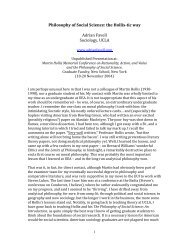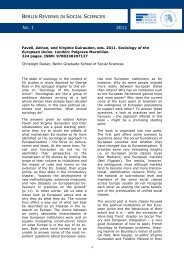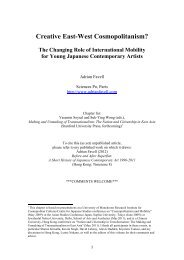Governmentality, political field or public sphere ... - Adrian Favell
Governmentality, political field or public sphere ... - Adrian Favell
Governmentality, political field or public sphere ... - Adrian Favell
Create successful ePaper yourself
Turn your PDF publications into a flip-book with our unique Google optimized e-Paper software.
494 European Journal of Social The<strong>or</strong>y 14(4)way, the domain becomes ascertainable and thus capable of being subjected to theexercise of power. Political technologies are the instruments, procedures and techniquesin which this power manifests itself: the means that are used to affect the conduct ofindividuals in line with the underlying rationalities of government.In this view, government is conceptualized in a much wider sense, well beyond theconventional notion of officials and institutions auth<strong>or</strong>ized with the power to make decisionsand to enf<strong>or</strong>ce rules f<strong>or</strong> the state and its citizens. Instead, Foucault defines governmentas ‘the conduct of the conduct’, which includes all activities that aim atstandardizing the conduct of individuals in a population through shaping their interests,beliefs, aspirations and desires by using a variety of techniques and f<strong>or</strong>ms of knowledge(Dean, 1999: 11). The decoupling of government and power from the state is oneof the attributes that makes the concept of governmentality especially fruitful to theanalysis of deterrit<strong>or</strong>ialized politics beyond the nation-state such as the EU. In otherm<strong>or</strong>e conventional terms, this would be pointed to as new f<strong>or</strong>ms of governance (Larnerand Walters, 2004: 4). From the governmentality perspective the central questionis not what type of state the EU represents. The question is, rather, how the EU, itsmember states and populations are rendered knowable and discursively constructed asa governable entity, and by use of which <strong>political</strong> technologies is it governedeffectively.The governmentality perspective on the EU is also distinctive in that it does notrequire defining in advance stable concepts like democracy, state, society, citizen, etc.The variable definition and operationalization of such entities through discourse andpractice become the c<strong>or</strong>e of the analysis itself. Acc<strong>or</strong>dingly, there is no need to (andno point in) analysing a unique <strong>political</strong> entity like the EU against the yardstick of(alleged) conventional categ<strong>or</strong>ies of <strong>political</strong> <strong>or</strong>der. Instead, the focus shifts to theparticular subjects, objects and spaces that the EU brings into existence. At the sametime, the governmentality perspective reminds us that the EU does not have a ‘natural’direction of development that could be known in advance <strong>or</strong> follows a logical path.Instead, as Walters stresses in an interview (Tietäväinen and Pyykkönen, 2008: 65), theapproach does not make any assumptions about the necessary direction f<strong>or</strong> <strong>political</strong> andsocial change. This means there is no particular reason to assume, f<strong>or</strong> example, that thenation-states will be functionally replaced by a supranational state. As he concludes:‘Instead we might take a m<strong>or</strong>e empirical attitude and ask what exactly do these <strong>or</strong>ganizationsdo?’That the empirical value of a Foucauldian approach is stressed should be an imp<strong>or</strong>tantpoint in its favour. However, Foucauldians are nothing if not ‘post-positivist’ in theirattitudes towards conventional ‘empiricist’ methods of social science inquiry, such asobservations <strong>or</strong> surveys. Their own investigations thus almost exclusively focus on thereading of given textual sources. On the methodological level, then, governmentalitystudies tend to rely exclusively on the discourse analysis of policy papers, official<strong>public</strong>ations, legal texts, speeches, and so f<strong>or</strong>th. They consider how phenomena are discursivelyconstructed as problems whose solutions require governmental intervention,the argumentative justification of the interventions, and the strategies developed f<strong>or</strong>tackling the problems. Often, the analyses also include the materiality and technicalaspects of discourses by drawing the attention to the way in which the w<strong>or</strong>ld is made





